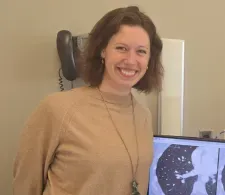Meet Molly: Relentless Resilience in the Face of Rare Cancer



Molly Hones had recently received her second rare cancer diagnosis in as many years—a rare liver cancer called fibrolamellar carcinoma (FLC). This time, it had spread to her lungs, elevating her diagnosis to stage 4.
Still, things were looking up: Just two weeks earlier, she’d joined a clinical trial at the Johns Hopkins Hospital in Baltimore, Maryland. And so, as she traveled the 900 miles from home for her third round of treatment, she felt hopeful.
But then, two days before her scheduled treatment, her phone rang.
Back home in Wisconsin, her husband of five years—Grant Hones—had passed away unexpectedly after experiencing a sudden aneurysm.
Molly was devastated.
She was 31 years old, coping with a second cancer diagnosis and grieving the death of her husband. “These are just two things that shouldn’t be happening to someone so young,” Molly says. “My life was filled with grief and uncertainty. There’s the loss of my husband. But there’s also a grieving process that happens when you get cancer.”
Even so, Molly was determined to be resilient in the face of tragedy.
It helped, she continues, that she was surrounded by support. That included Johns Hopkins oncologist Marina Baretti, MD. A two-time Conquer Cancer grant recipient, Dr. Baretti was the lead investigator on the clinical trial in which Molly enrolled. Funded by a three-year Conquer Cancer research grant, the study was testing a vaccine that could prevent recurrence of FLC, a cancer particularly prone to recurrence.
“Molly is a phenomenal woman,” Dr. Baretti says. “When people join a trial like this, of course, one of the big motivations is to help themselves. But she was also really motivated by trying to advance science and maybe even contribute to finding a cure. She’s doing this for everyone who has been there before and for everyone who will be here after her as well.”
Learn more about rare cancer research and how to make an impact for patients like Molly.
What makes rare cancers so hard to treat?
In an ideal world , every cancer would have its own unique standard treatment, one rooted in research and designed to target a patient’s specific diagnosis.
But for now, some cancers—particularly rare ones—still lack widely accepted standards of care or targeted therapies. That includes FLC, which affects only an estimated 0.02 out of 100,000 people in the U.S. “When you look at the statistics,” she says, “it’s scary and isolating.”
In the U.S., a rare cancer is typically considered one with fewer than 6 cases per 100,000 people each year (for context, breast cancer affects 1 in 8 women ). But combined, rare cancers ultimately comprise an estimated 25 percent of all cancer diagnoses , making them collectively not uncommon.
Rarity, however, is not a cell or a gene or a molecule that can be targeted. Drugs need a target, something they can take aim at, latch onto, and, ultimately, disrupt or destroy. And, because every cancer differs from the next—including the way it grows and spreads—each one also requires its own unique treatment.
“It's not exactly the best luck to be diagnosed with something that happens in only 1 in 5 million people because there's not a ton of research going into it,” Molly says. “People with rare cancers don’t have massive public awareness campaigns or the kind of national partnerships that common cancers benefit from. Those are things that are out of my control, so I focused on what I could do to help. I wanted to contribute in any way I could.”
Which is why, even in the face of an aggressive and frightening diagnosis, Molly felt fortunate when she and her treatment team learned she qualified for the clinical trial at Johns Hopkins. From there, she says, “Things moved at a blistering pace. I went from finding out I had stage 4 cancer to joining the trial and getting my first treatment in less than six weeks.”
Conquering Rare Cancer and Living Life in Technicolor
In the hours immediately after learning about Grant’s passing, Molly faced a heartbreaking decision: Did she return home right away? Or did she remain in Baltimore to finish her scheduled treatment?
Then she remembered the mantra that her husband had repeated to her over and over again in the days leading up to her first treatment at Johns Hopkins—a quote from the movie “Dazed and Confused.”
“‘You just gotta keep livin’, man.’”
“My husband kept on repeating the ‘Dazed and Confused’ quote over and over again until it became engraved into my mind,” Molly recounts. “Grant was a veteran and spent his career in Iraq and Afghanistan. He often spoke about getting through loss and tough times with humor and determination, even if it felt like all hope was lost.”
And so, she made her decision. “In the wake of his death,” she wrote in a blog post, “I made a promise to myself: I was going to keep up with cancer treatment that week. I was going to be resilient. I was going to rally. After all, I am a survivor. In more ways than one.”
That was June 2024. Three months later, she was declared cancer-free, and she remains so today. She’s also determined to live her life as fully and vividly as possible, in hopes of inspiring others to do the same.
“When I started my cancer journey, I remember thinking, ‘I’m 30 years old. I know my time is limited. All of our time is limited,’” she says. “If I’m going out, I’m going out in the driver’s seat. I’m going to be the one who is the happiest, experiencing all of the joy, who sees the beauty in life’s ups and downs. I can’t control how much time I have, but I can choose to live a life in technicolor, and to help make sure the science keeps moving so others can, too.”
Hear stories from people conquering cancer around the world. Check out our podcast “Your Stories.”
